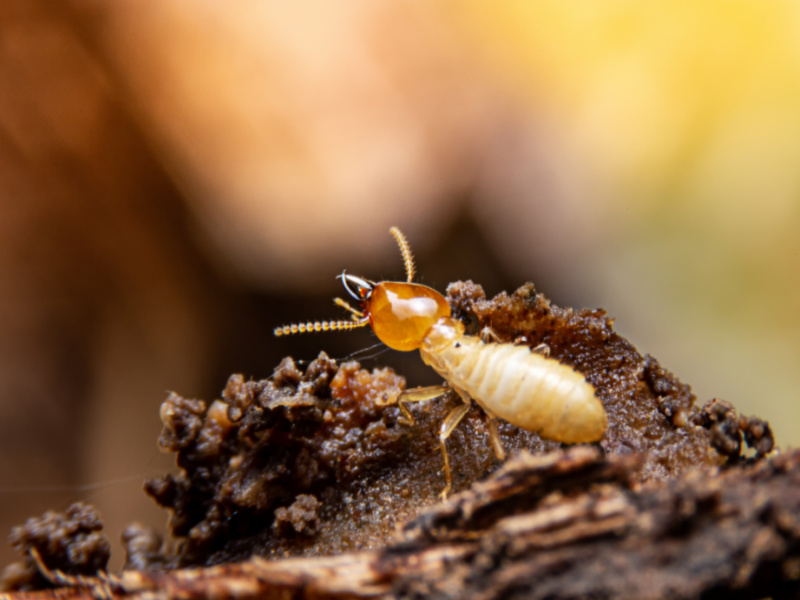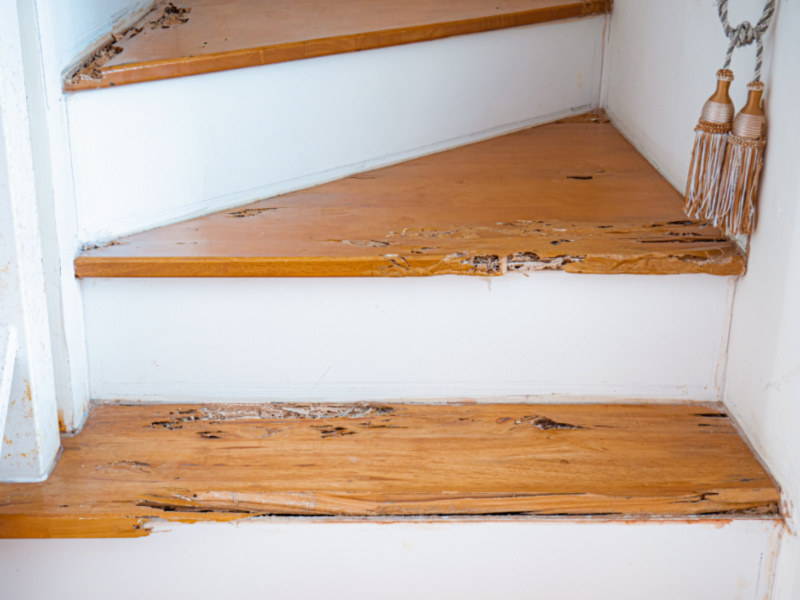Termites are any homeowner’s nightmare. Over time, these little wood-chomping invaders can cause serious damage to your home.
So what’s a homeowner to do? And is termite damage covered by homeowners insurance?
In short, no. Much like with bedbugs, most insurance companies will not cover termite damage. The idea of homeowners insurance is that it covers sudden damage to your home—and termite damage is not sudden. It takes about three to eight years for termites to do substantial damage to a property.
With that in mind, it is important to know how termites work and what sort of damage they could do to your home.
What are termites?

Termites are insects that live in social colonies in wood or in the ground. They feed on cellulose in wood and wood by-products, like paper. There are three types of termites that live in the United States:
- Subterranean termites. As their name implies, these termites live in soil. They feed on the wooden structure of homes. These types of termites can be found in every state in the United States except Alaska, but they prefer warm climates.
- Drywood termites. These termites live in dry wood: the frame of a house, flooring, or furniture. They are mostly found in the warmer states of the southeastern United States.
- Formosan termites. These bugs cause damage by boring holes into wood and living in the tunnels they create. They are the most destructive of the various types of termites. They, too, are mostly found in the southeastern United States.
Signs of termite damage

Keep your eyes peeled for the initial signs of a termite issue. You may see dirt tunnels near your home’s foundation. They can often look like vines climbing their way up your house. You may also see maze-like patterns in the wood around your house. These are signs that termites are chewing through.
Other signs of termite damage can be less obvious. Termites tend to hollow out wood. If you suspect that you have a termite infestation, you should go through your house with a screwdriver, knocking on places you think may be infested and listening to see if they sound hollow. In addition, termite damage may appear in the form of sagging or buckling floorboards, or cracks or holes in the wood around your house.
You may also spot actual termites, termite wings, or termite droppings in the vicinity of your home. Termite look sort of like ants, but with wings, and they vary in color—from pale red, light brown or white, to dark brown or black (depending on what role they serve in the colony).
Seeing evidence of termites in the areas around your home does not necessarily mean that you have a termite infestation, but it does probably mean you at least have termites in your yard, and that is something you should keep an eye on.
Repairing termite damage
It’s unlikely that termites will do serious damage to your home before you discover them. Still, it’s always better to get things taken care of as soon as possible.
The first thing you should do upon discovering termite damage is to call your local exterminator and make an appointment to eliminate the infestation. The specialist will do a termite inspection and should be able to tell you where the termite damage is the most severe, and how to prevent termite damage in the future. Most importantly, they will eradicate the existing termites.
Once you no longer have any termites in your home, you can start to repair the damage they caused, by either replacing the damaged sections of wood entirely, or adding additional wood as support close to the damaged wood. The second option is less expensive and quicker, but could also be less aesthetically pleasing, depending on where the damage is.
How to prevent termite damage

Prevention is your best defense against termite damage. If you live in an area that is prone to termites, it is a good idea to have a termite specialist come and do an annual inspection.
However, there are some things you can do on your own as part of your regular home maintenance routine.
- Check your doorframes, windows and other wooden areas of your home regularly for signs of termites
- Ensure that water doesn’t collect at the foundations of your house. Make sure your storm drains don’t empty too close to your home
- Don’t store firewood on your porch, and remove piles of damp wood and branches around your property
- Keep your garden a few feet away from the house, and fix all leaky faucets, roofing, or gutters
Protecting your home year-round
As a responsible homeowner, you want to do everything you can to keep termites off your property. After all, you don’t want these pests tunneling through the biggest investment you’ve ever made.
While homeowners insurance might not cover infestations, there are countless other perils that a policy will protect you against. Whether you’re a new homeowner or a real-estate veteran, check out Lemonade’s homeowners insurance coverage and see what we can do for you.
A few quick words, because we <3 our lawyers: This post is general in nature, and any statement in it doesn’t alter the terms, conditions, exclusions, or limitations of the policies issued, which differ according to your state of residence. You’re encouraged to discuss your specific circumstances with your own professional advisors. The purpose of this post is merely to provide you with info and insights you can use to make such discussions more productive! Naturally, all comments by, or references to, third parties represent their own views, and Lemonade assumes no responsibility for them. Coverage may not be available in all states. Please note that statements about coverages, policy management, claims processes, Giveback, and customer support apply to policies underwritten by Lemonade Insurance Company or Metromile Insurance Company, a Lemonade company, sold by Lemonade Insurance Agency, LLC. The statements do not apply to policies underwritten by other carriers.




